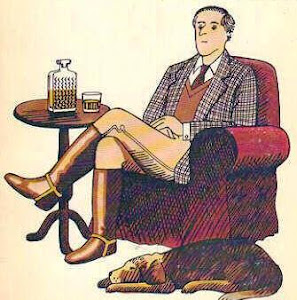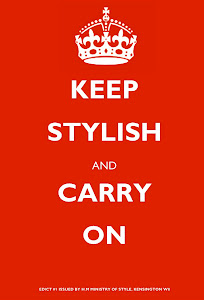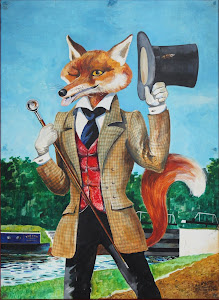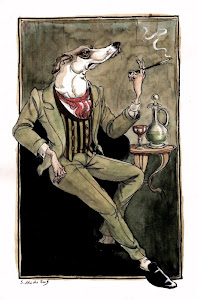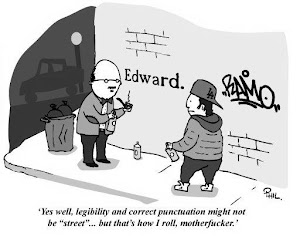30 June 2011
Geo. F. Trumper: The Sandalwood Affair
I first encountered this scent as a young man in South Kensington SW7 circa 1986. It was an unexpected, unlooked-for present from my mother two or three years after she had abandoned us for a drug-soaked hippy commune in California. It is the only such gift from her I can recall today.
What lay behind the gesture? Maybe, I thought at the time, she reasoned it would help me attract a girlfriend, a sort of compensation for her absence, I suppose, as mother-poor chaps are not exactly prime romantic material where women are concerned. Not, of course, that I needed any help in pulling totty.
Anyway, for a year or two I kept the cologne on the bathroom ledge in front of me while I shaved. The description on the back of the box, which I well remember, reads thus:
Sandalwood is a very rare and precious perfume and its popularity has caused many substitutes and inferior preparations to be produced.
To uphold our tradition of excellence, the Sandalwood oil used by Trumpers in the manufacture of our products is only of the very highest quality and originates from the mountainous Mysore area of India, the centre of world Sandalwood production.
"Santalum album", the Sandalwood tree is a marvel in itself, related to the English Mistletoe, it is a parasitic tree growing to a height of 40 feet and thriving best in the mountainous region of Mysore.
The history of Sandalwood is as old as civilisation itself. In Egypt it was known as long ago as 1700 BC and has been held in high esteem ever since. It has been used ads a burning material during religious rites of some of the world's greatest religions. The wood has also proved of excellent quality for carving but by far the greatest use has been for the extraction of Sandalwood oil from the heartwood of the tree.
Ever since the days of the Empire and the long association with India, Trumpers have been producing fine Sandalwood prefumes and preparations for gentleman.
Our Sandalwood Cologne continues that Trumper tradition.
Mysore. India. Egypt. Empire. Just the name itself--Trumper--encourages thoughts of all these things.
Sandalwood, however, provokes reflections of a different kind.
29 June 2011
28 June 2011
Dinner Clothes
| A.N. Wilson: Young Fogey |
Only shawl or peaked lapels are used for dinner clothes. Peaked derives its heritage from the tailcoat, shawl from the smoking jacket. The shawl lapel produces a softer, old-world image and tends to be used on alternative dinner jackets such as the white summer dinner jacket, velvet smoking coat, or more idiosyncratic ones in wool tartan or cotton madras. Men with round faces or less muscular physiques generally look smarter in the uplifting, sharper-angled, pointed-end peaked lapel. Both lapels possess the sweep and self-importance that helps differentiate the black-tie coat from the less formal suit jacket.
Style and the Man, Alan Flusser (1996)
27 June 2011
26 June 2011
Superfine Trousers
"In fact trousers...had primitive origins. They were the mark of the French peasants and workmen, the sans-culottes, who did not wear elaborate breeches or culottes, of fine wool, silk or satin, but what were later called dungarees or overalls. In the early 1790s, members of the Assemblée nationale adopted them. The fashion spread across the Channel when the advanced Whigs, led by Charles James Fox, adopted trousers. At this point the tailor stepped in, turning the rustic garment into elegant attire by making it of superfine cloth, shaping it to the leg, adding pockets, and putting an elastic band under the instep--a device which delighted smart cavalry regiments and, according to George Orwell in 1947, 'gave you a feeling like nothing else on earth'. Beau Brummell was both architect and beneficiary of the 'smart trousers', which made male legs so alluring in ladies' eyes that Pope Pius VII condemned them as sinful, and the garment was taboo in Rome until 1827. But everywhere else it flourished mightily."
'The power of a pocket,' Paul Johnson, The Spectator, 4 June 2011
'The power of a pocket,' Paul Johnson, The Spectator, 4 June 2011
25 June 2011
24 June 2011
23 June 2011
On Baldness
 They say bald is beautiful. I would add, it is bold too.
They say bald is beautiful. I would add, it is bold too. I'm not bald myself, you understand. I've a slight widow's peak, true, but that's all. So far, anyway. And yes, in the past I've shaved my hair to gain speed on the squash court. Today I keep it clipped short to the point where, as I've mentioned before, I'm often asked if I'm a cop or a Russian gangster. What's up with that?
If I were to start losing hair, I would keep the remnant very short, cropped in the Punk- or Prussian-style. There's no use in disguising the natural and inevitable.
I abhor long hair on men. I think there's something unmanly about long hair. It doesn't look right. I suppose it's fine on young pretty boys, or the Irish, but as chaps age short hair is more appropriately masculine.
Women often prefer long-haired blokes because they appear young, soft, and non-threatening. This fact probably accounts for the absurd lengths to which some balding men go to preserve their hair, or at least the appearance of hair.
If you're a man and you're starting to go bald, you should immediately break out the shears and crop it. Now. If you don't, I will.
I have to admit, I've always been drawn to bald men. Not in a sexual way of course, but because of their approach to life. Bald men exhibit what I call a swaggering "I don't give a shit attitude" that seems to say: "Yeah, I'm bald, bitchez. So what? Deal with it. If you don't like it, then fuck off."
That's the essence!
It's a well-known scientifical fact that baldness is due to a surfeit of testosterone. In other words, what bald chaps lose in hair they gain in todger size. Keep this in mind, ladies, the next time you're approached by a grinning baldie.
There are three bald men in my life and each of them is an inveterate ladies' man. One of the bald chaps is a fit gent in his mid-60s with whom I've played lawn tennis. Every time I see him he's with a different hot girl. Hired tottie or not, I suppose it's the urge that matters.
Go, baldie, go!
Labels:
Admiral Cod
22 June 2011
Pistols for Two - Breakfast for One
'English gentleman seeks easy life featuring exquisite tailoring and fine women.
Tiresome encumbrances such as political intrigue, murder or Mafiosi need not apply.
An episode in the life of Hugo Hammersley—formerly of HM diplomatic service—bon vivant, self-confessed genius and serial connoisseur of the fairer sex.
Through a series of chance encounters, Hammersley is shoehorned into investigating the murder of a notable British citizen in Italy and the disappearance of the priceless gold coin he carried.
Complications surface, however, when Hammersley finds himself recruited by a leading Mafioso to assist in his current enterprise: the reinstatement of the Italian monarchy.
Where the Mafia leads, beautiful women will always follow, and Hammersley finds himself in more than one compromising but familiar position—and not just because of the raging Mafia turf war.
Through a mixture of his usual allies – charm, cunning and damned good fortune – Hammersley is left standing (just about). Whether he makes it safely back home with the elusive gold coin in his pocket… well, that may be another story.'
Tiresome encumbrances such as political intrigue, murder or Mafiosi need not apply.
An episode in the life of Hugo Hammersley—formerly of HM diplomatic service—bon vivant, self-confessed genius and serial connoisseur of the fairer sex.
Through a series of chance encounters, Hammersley is shoehorned into investigating the murder of a notable British citizen in Italy and the disappearance of the priceless gold coin he carried.
Complications surface, however, when Hammersley finds himself recruited by a leading Mafioso to assist in his current enterprise: the reinstatement of the Italian monarchy.
Where the Mafia leads, beautiful women will always follow, and Hammersley finds himself in more than one compromising but familiar position—and not just because of the raging Mafia turf war.
Through a mixture of his usual allies – charm, cunning and damned good fortune – Hammersley is left standing (just about). Whether he makes it safely back home with the elusive gold coin in his pocket… well, that may be another story.'
21 June 2011
College Daze
The head of PIMCO (Pacific Investment Management Company), William Gross, has just published a new 'Investment Outlook' piece criticising the American college bubble. I respect Mr. Gross and often see him with his attractive wife out and about in Newport Beach. His PIMCO partner, Mohamed El-Erian, and others, including some of the country's top property developers, are sometimes spotted smoking cigars and drinking rare whisky at The Ritz on Friday evenings. I know this, because I was there.
Too many Americans, according to Mr. Gross in his article, are going to college at a time when there are too few jobs. This makes sense. It is a position with which I fully agree. I have written about this before. In 1995, as a newly-hired analyst at a bank in New York City, fresh out of university, I was invited along with some colleagues to a meeting chaired by senior-level executives to solicit views on the university experience. My opinion then, as now, was that college is largely a waste of time and far too many people attend, when in fact most of them should be tending farm, managing shops, or working in factories. My remarks were greeted with silence. I was not invited back.
Mr. Gross claims subjects studied at college are not always relevant to the needs of the global economy, targeting in particular the liberal arts. He is barking up the wrong tree. According to a Georgetown University study, a mere 9.7% of university students in the US study liberal arts. It is hardly a problem worth writing about. Liberal arts graduates are essential. After all, the world will always need leaders, managers, visionaries, and creative geniuses. And we will always need educated individuals prepared to transmit the achievements of the West to future generations. If one is not studying the liberal arts (and maths and sciences), one does not belong at university. It is that simple. For the overwhelming majority of people, there are trade schools, apprenticeships, guilds, and technical-vocational colleges.
There is an enormous hole in Gross's analysis, and it is this: immigration. As he points out, only 1.8 million jobs have been created in the US over the last 10 years, while the labour pool has increased by over 15 million. How can this be? Like the housing bubble, I would argue, it is largely driven by mass uncontrolled third world immigration and its knock-on effects such as higher fertility of newcomers. The US faces a glut of foreign workers of dubious quality. Pushing them through college and vocational school will do little to remedy genetic and cultural deficiencies. When Gross laments the lack of jobs, unemployment rate, and poor skills of workers, however, while at the same time advocating skills-based education, government works programmes, and lower US labour prices to compete with the developing world, he is inadvertently excusing and promoting immigrationism. It is an extremist ideology to which liberal US elites have been addicted since the 1960s. Immigrationism has ravaged our communities, culture, and economy, planting the seeds of bloody conflicts to come. It is only going to get worse. Stay tuned.
It is time to face reality. Let us talk in plain terms. Gross warns of "long-term disconnects in employment." What he really means, I think, is that the US has become a third world country, inhabited by third world people, with a third world economy--and Americans had better get used to it. Indeed, the emerging picture of America portrays a declining high-IQ white majority steadily replaced by a hostile low-IQ non-white minority whose population growth shows no signs of slowing. In effect, says Gross and others like him, to compete with global sweatshops the US itself must become a third world sweatshop. This is the American future. Deal with it.
We have heard this line before and we can no longer tolerate it. Baby Boomers have spent decades emasculating and hollowing-out the US, and still they refuse to accept responsibility for their crimes. Would you pardon one if one were tempted to hit the motherfuckers hard in the face?
How do you solve a problem like Treason?
Too many Americans, according to Mr. Gross in his article, are going to college at a time when there are too few jobs. This makes sense. It is a position with which I fully agree. I have written about this before. In 1995, as a newly-hired analyst at a bank in New York City, fresh out of university, I was invited along with some colleagues to a meeting chaired by senior-level executives to solicit views on the university experience. My opinion then, as now, was that college is largely a waste of time and far too many people attend, when in fact most of them should be tending farm, managing shops, or working in factories. My remarks were greeted with silence. I was not invited back.
Mr. Gross claims subjects studied at college are not always relevant to the needs of the global economy, targeting in particular the liberal arts. He is barking up the wrong tree. According to a Georgetown University study, a mere 9.7% of university students in the US study liberal arts. It is hardly a problem worth writing about. Liberal arts graduates are essential. After all, the world will always need leaders, managers, visionaries, and creative geniuses. And we will always need educated individuals prepared to transmit the achievements of the West to future generations. If one is not studying the liberal arts (and maths and sciences), one does not belong at university. It is that simple. For the overwhelming majority of people, there are trade schools, apprenticeships, guilds, and technical-vocational colleges.
There is an enormous hole in Gross's analysis, and it is this: immigration. As he points out, only 1.8 million jobs have been created in the US over the last 10 years, while the labour pool has increased by over 15 million. How can this be? Like the housing bubble, I would argue, it is largely driven by mass uncontrolled third world immigration and its knock-on effects such as higher fertility of newcomers. The US faces a glut of foreign workers of dubious quality. Pushing them through college and vocational school will do little to remedy genetic and cultural deficiencies. When Gross laments the lack of jobs, unemployment rate, and poor skills of workers, however, while at the same time advocating skills-based education, government works programmes, and lower US labour prices to compete with the developing world, he is inadvertently excusing and promoting immigrationism. It is an extremist ideology to which liberal US elites have been addicted since the 1960s. Immigrationism has ravaged our communities, culture, and economy, planting the seeds of bloody conflicts to come. It is only going to get worse. Stay tuned.
It is time to face reality. Let us talk in plain terms. Gross warns of "long-term disconnects in employment." What he really means, I think, is that the US has become a third world country, inhabited by third world people, with a third world economy--and Americans had better get used to it. Indeed, the emerging picture of America portrays a declining high-IQ white majority steadily replaced by a hostile low-IQ non-white minority whose population growth shows no signs of slowing. In effect, says Gross and others like him, to compete with global sweatshops the US itself must become a third world sweatshop. This is the American future. Deal with it.
We have heard this line before and we can no longer tolerate it. Baby Boomers have spent decades emasculating and hollowing-out the US, and still they refuse to accept responsibility for their crimes. Would you pardon one if one were tempted to hit the motherfuckers hard in the face?
How do you solve a problem like Treason?
Labels:
Admiral Cod
20 June 2011
19 June 2011
18 June 2011
The Punch Guide to Good Living (1972)
'This is a very dangerous book. It may well get banned. This book is about all the things that are bad for you. It is about eating food, drinking booze, chasing women, not going to bed, not getting up, driving fast cars, and generally behaving as if there were no tomorrow. But ending up with some good yesterdays, all the same. It is not to be recommended to celibate teetotal dieters who need nine hours kip per night. Unless they want to find out what they've been missing all these years.'
Bingo. I can well appreciate this kind of thinking. I am not being naughty, as I keep telling you, I am simply creating lots of good yesterdays.
17 June 2011
On Lapels
 The 1960s produced a lot of nonsense and mayhem: the Vietnam war, sitar music, the civil rights and immigration acts, long hair, Baby Boomers, and the Kennedy administration (for which my hard-line WASP mother's family still can not forgive American voters). To this list we must add: narrow lapels.
The 1960s produced a lot of nonsense and mayhem: the Vietnam war, sitar music, the civil rights and immigration acts, long hair, Baby Boomers, and the Kennedy administration (for which my hard-line WASP mother's family still can not forgive American voters). To this list we must add: narrow lapels. Narrow lapels, like skinny denim, seem to be all the rage amongst the younger set today, considered cool, trendy, Mod-ish, though I doubt even 1 in 20 American children even knows what a Mod is. Not that it matters to me. When it comes to the Mod versus Rocker debate, I was always on the side of the Punks, New Romantics, and Dandies.
I suspect some of the current narrow-lapelism is attributable to televisual programmes such as Madmen, a fictional entertainment produced by the sons and grandsons of men who were still largely societal outsiders at the time depicted in the series. It is an adolescent fantasy of what American life was like a few decades ago just prior to the revolution and Occupation, but as such it has had a remarkable influence on menswear, I think, at least where lapels are concerned.
You might be interested to know I recently performed a quantitative analysis of my own lapels, using a sample consisting of the seven (7) suits I wear most frequently: Brooks Brothers, Southwick, H. Freeman & Sons, Corneliani, and Hickey Freeman. The resulting lapel widths are as follows:
(1) 3.25
(2) 3.50
(3) 3.25
(4) 3.75 (H. Freeman)
(5) 3.50
(6) 3.25
(7) 4.00 (Southwick)
*Measurement system: Imperial Units (inches)
So there we have it. The mean width is 3.50" with a standard deviation of approximately 0.27". That seems about right. Anything narrower and one risks looking like a desperate extra from a Madmen set, or a club-kid fresh from the local disco.
Moderation is the key to virtue, as Aristotle tells us, so it is important to avoid both skinny and fat lapels. Keep to the middle path.
I would be interested to know about other lapel experiences. What's in your closet?
Labels:
Admiral Cod,
Style
16 June 2011
15 June 2011
Chavs and Toffs United
A few brief words to clear up a misunderstanding.
A fortnight ago Lord Fellowes (Julian Fellowes, creator of Downton Abbey) argued in an interview in The Times that what he calls ‘poshism’ is the 'last acceptable form of discrimination.' The article explains:
"Recently, [Fellowes] was watching Loose Women — “a programme I rather enjoy” — and one of the participants declared: “I hate posh blokes.” Lord Fellowes says: “There was a cheer from the audience. If I said, ‘I hate Americans’, or ‘I hate blondes’, or ‘I hate common blokes’, that wouldn’t work. But somehow that one was OK.
“And of course it’s not OK. I suppose ‘poshism’ is the last acceptable form of discrimination. Having been fat, bald, posh and male I’m used to a certain amount of humour at my expense but rather than striving towards a pseudo-egalitarianism that in 2,000 years of recorded history has failed to come about, I think we should strive for a position of giving people their worth and being polite.”'
Modern culture encourages a resentment and hatred for toffs: people who speak well, attend good schools, who have what are perceived as old-fashioned manners and ideals, and who, most importantly, represent the old, dispossessed establishment. But I think it goes beyond that, as I explain below.
A few days later, Guardian columnist Polly Toynbee penned a piece criticising the growing demonisation of the white working class in Britain, in particular its underclass variant, commonly known as the 'chav.' It is genuine class hatred, she argues, and extends beyond merely dressing up as chavs at costume parties or imitating working class accents. In fact a whole book has just been published on the phenomenon. Responding to public anti-chav remarks made by leftist Baroness Hussein-Ece, the priviliged daughter of imported Turks who currently sits in the House of Lords, Tonybee writes:
"She would presumably never say nigger or Paki, but chav is acceptable class abuse by people asserting superiority over those they despise..."
Fellowes and Toynbee, for obvious reasons, do not go far enough, avoiding controversy. The reason chavs and toffs are targets of the professional middle class in Britain, which especially in London has taken on an increasingly foreign and internationalist hue, is that their existence offends the egalitarian agenda imposed on Western societies by free-market social engineers and Marxist power elites over the last several decades. (Tony Blair: "We are all middle class now"). They are a living rebuke to the egalitarian project.
Furthermore--and this is crucial--both chav and toff possess a clear sense of class, conservatism, and tribal identity at a time when whites--and only whites--in the West are instructed to discard such identities and submerge themselves in the noxious acid bath of the global-consumer multikult. That's what really rankles the bolsheviks who hurl their foul spittle-flecked invectives at chav and toff alike.
A fortnight ago Lord Fellowes (Julian Fellowes, creator of Downton Abbey) argued in an interview in The Times that what he calls ‘poshism’ is the 'last acceptable form of discrimination.' The article explains:
"Recently, [Fellowes] was watching Loose Women — “a programme I rather enjoy” — and one of the participants declared: “I hate posh blokes.” Lord Fellowes says: “There was a cheer from the audience. If I said, ‘I hate Americans’, or ‘I hate blondes’, or ‘I hate common blokes’, that wouldn’t work. But somehow that one was OK.
“And of course it’s not OK. I suppose ‘poshism’ is the last acceptable form of discrimination. Having been fat, bald, posh and male I’m used to a certain amount of humour at my expense but rather than striving towards a pseudo-egalitarianism that in 2,000 years of recorded history has failed to come about, I think we should strive for a position of giving people their worth and being polite.”'
Modern culture encourages a resentment and hatred for toffs: people who speak well, attend good schools, who have what are perceived as old-fashioned manners and ideals, and who, most importantly, represent the old, dispossessed establishment. But I think it goes beyond that, as I explain below.
A few days later, Guardian columnist Polly Toynbee penned a piece criticising the growing demonisation of the white working class in Britain, in particular its underclass variant, commonly known as the 'chav.' It is genuine class hatred, she argues, and extends beyond merely dressing up as chavs at costume parties or imitating working class accents. In fact a whole book has just been published on the phenomenon. Responding to public anti-chav remarks made by leftist Baroness Hussein-Ece, the priviliged daughter of imported Turks who currently sits in the House of Lords, Tonybee writes:
"She would presumably never say nigger or Paki, but chav is acceptable class abuse by people asserting superiority over those they despise..."
Fellowes and Toynbee, for obvious reasons, do not go far enough, avoiding controversy. The reason chavs and toffs are targets of the professional middle class in Britain, which especially in London has taken on an increasingly foreign and internationalist hue, is that their existence offends the egalitarian agenda imposed on Western societies by free-market social engineers and Marxist power elites over the last several decades. (Tony Blair: "We are all middle class now"). They are a living rebuke to the egalitarian project.
Furthermore--and this is crucial--both chav and toff possess a clear sense of class, conservatism, and tribal identity at a time when whites--and only whites--in the West are instructed to discard such identities and submerge themselves in the noxious acid bath of the global-consumer multikult. That's what really rankles the bolsheviks who hurl their foul spittle-flecked invectives at chav and toff alike.
Labels:
Admiral Cod
14 June 2011
Evelyn Waugh on Wine
 '...It is a little shy wine like a gazelle.'
'...It is a little shy wine like a gazelle.''Like a leprechaun.'
'Dappled, in a tapestry meadow.'
'Like a flute by still water.'
'A prophet in a cave.'
'...And this is a necklace of pearls on a white neck.'
'Like a swan.'
'Like the last unicorn.'
'Ought we to be drunk every night?' Sebastian asked one morning.
'Yes, I think so.'
'I think so too.'
Labels:
Brideshead Revisited,
Cocktails,
Waugh,
Wine
12 June 2011
Clear Your Mind
“My dear friend, clear your mind of cant. You may talk as other people do: you may say to a man, ‘Sir, I am your most humble servant.’ You are not his most humble servant...You may talk in this manner; it is a mode of talking in Society; but don’t think foolishly.”
The Life of Samuel Johnson, LL.D., James Boswell (1791)
The Life of Samuel Johnson, LL.D., James Boswell (1791)
11 June 2011
10 June 2011
09 June 2011
Just The One: The Wives and Times of Jeffrey Bernard (Graham Lord)
 "A biography of the legendary bohemian British journalist, drinker and womaniser whose rackety life was immortalised on the London West End stage by Peter O'Toole in Keith Waterhouse’s award-winning play Jeffrey Bernard is Unwell and in later productions by Tom Conti, James Bolam, O’Toole again and Dennis Waterman.
"A biography of the legendary bohemian British journalist, drinker and womaniser whose rackety life was immortalised on the London West End stage by Peter O'Toole in Keith Waterhouse’s award-winning play Jeffrey Bernard is Unwell and in later productions by Tom Conti, James Bolam, O’Toole again and Dennis Waterman.Bernard, who died in 1997, was a most unlikely hero of our times. What other bottle-of-vodka-and-50-cigarettes-a-day scribbler has also been a gigolo, navvy, fairground boxer, miner, stagehand, film editor and actor? Who else has been married four times, seduced 500 lovers (including several famous actresses) and become a personal friend of the novelists Graham Greene and Alice Thomas Ellis, the painters Francis Bacon and Lucian Freud, the jockeys Lester Piggott and Fred Winter, the actors Tom Baker, John Hurt, John le Mesurier and Wendy Richard?
Bernard was compared to Pepys and Boswell, had a racehorse named after him, and was described by his admirer John Osborne as “the Tony Hancock of journalism.” He was convicted of shoplifting, tax-dodging and assaulting a rubber-plant and wrote regularly for numerous newspapers and magazines from the Daily Mirror, Daily Express, Queen and Men Only to The Sporting Life and his famous ‘Low Life’ diary column in The Spectator – his notorious ‘suicide note in weekly instalments.’
Graham Lord was a friend of Bernard’s for twenty years and interviewed dozens of his other friends – and enemies – to write a biography that is fun, frank and critical yet unexpectedly touching. Jeffrey Bernard was indeed unique – just the one."
l’accélération de l’histoire
 'La guerre civile ethnique sera-t-elle le seul moyen de traîter “à chaud” un problème qui ne pourra plus jamais trouver de solution “à froid”, dans le cadre de l’Etat de droit ou de la démocratie, et de faire effectuer une prise de conscience de la nécessité de résistance et de reconquête ? Entendons-nous bien, je n’appelle pas à la guerre, mais considère sa fatalité comme automatique. Les solutions de “cohabitation rationnelle et pacifique” de type communautariste appartiennent aux croyances enfantines d’intellectuels iréniques et rationalistes, ignorants en sociologie comme en histoire. Ce n’est que le dos au mur, face aux cas d’urgence, dans les crises que les peuples se mobilisent et trouvent des solutions en d’autres temps impensables. Ce fut par la reconquista armée que l’Espagne se débarrassa de l’occupation arabo-musulmane. Mais elle y mit du temps, et, avec l’accélération de l’histoire, on peut en mettre moins. L’essentiel est de se préparer à cette échéance inéluctable.'
'La guerre civile ethnique sera-t-elle le seul moyen de traîter “à chaud” un problème qui ne pourra plus jamais trouver de solution “à froid”, dans le cadre de l’Etat de droit ou de la démocratie, et de faire effectuer une prise de conscience de la nécessité de résistance et de reconquête ? Entendons-nous bien, je n’appelle pas à la guerre, mais considère sa fatalité comme automatique. Les solutions de “cohabitation rationnelle et pacifique” de type communautariste appartiennent aux croyances enfantines d’intellectuels iréniques et rationalistes, ignorants en sociologie comme en histoire. Ce n’est que le dos au mur, face aux cas d’urgence, dans les crises que les peuples se mobilisent et trouvent des solutions en d’autres temps impensables. Ce fut par la reconquista armée que l’Espagne se débarrassa de l’occupation arabo-musulmane. Mais elle y mit du temps, et, avec l’accélération de l’histoire, on peut en mettre moins. L’essentiel est de se préparer à cette échéance inéluctable.'Extraits du livre, Pourquoi nous combattons, Guillaume Faye (2001)
Labels:
Guillaume Faye
08 June 2011
A Guide to iGents
In recent weeks I have received several inquiries as to the meaning of the term iGent. This is my reply.
The term iGent refers to the pompous, stuffy, serious little men on Interweb clothing forums. Or, as they would relish in pointing out, fora.
They desperately aspire to be gentlemen, members of the elite, and spend vast reserves of time and money acquiring the (faux) manners, clothing, cultural pursuits, politics, and accoutrements thereof.
Sometimes they even acquire a pedigree.
They often affect a liking for Jazz.
Their natural habitat includes several Interwebsites devoted to men's clothing.
Being an iGent is serious business to be pursued with solemn, humourless determination.
Young iGents, a particularly unattractive and self-satisfied breed, are sometimes known by other names, such as Trads.
Trads confer unique meaning on relatively cheap brands of clothing, shoes, and watches as a way of signifying their membership of what they consider an exclusive club, without actually having to achieve anything noteworthy or fork over the large sums that would be required of them in the real world.
Some iGents, particularly the young and the cheap, obtain their affordable clothing through thrifting, which is considered a sort of Sacrament bestowing upon the practitioner a blessed chosenness.
The behaviour of iGents is a form of competitive status-seeking and one-upmanship.
How does one know if one is in the presence of an iGent? He will use the word commission a lot.
In some cases, iGents can be cured by getting laid.
Above all, iGents yearn to be correct.
They delight in critiquing the clothing of others and pointing out minor differences in style and taste, which they consider incorrect.
A fellow columnist at another newspaper kindly sent me several examples of typical iGent behaviour, which I reproduce here with his permission:
"The jacket needs to be taken in another half inch, and the [trouser] cuffs could use a sharper forward press"
"I would have paired it with a lighter blue pocket square with a yellow or white trim near the roll"
"No gentleman would be caught dead with a reversible belt"
"I couldn't help but notice that you like to wear your jacket cuff too long. It should ride about an inch higher above your thumb than where you have it"
"I think that those cap-toes don't work with the flannel pants and the [shirt's] collar points are too spread for the lapel shape"
"If the herringbone pattern were at a steeper pitch than 90 degrees, those pants would be more suitable. Consider having them remade"
If you are aware of other examples of iGentism, do let us know.
Consider yourself warned.
The term iGent refers to the pompous, stuffy, serious little men on Interweb clothing forums. Or, as they would relish in pointing out, fora.
They desperately aspire to be gentlemen, members of the elite, and spend vast reserves of time and money acquiring the (faux) manners, clothing, cultural pursuits, politics, and accoutrements thereof.
Sometimes they even acquire a pedigree.
They often affect a liking for Jazz.
Their natural habitat includes several Interwebsites devoted to men's clothing.
Being an iGent is serious business to be pursued with solemn, humourless determination.
Young iGents, a particularly unattractive and self-satisfied breed, are sometimes known by other names, such as Trads.
Trads confer unique meaning on relatively cheap brands of clothing, shoes, and watches as a way of signifying their membership of what they consider an exclusive club, without actually having to achieve anything noteworthy or fork over the large sums that would be required of them in the real world.
Some iGents, particularly the young and the cheap, obtain their affordable clothing through thrifting, which is considered a sort of Sacrament bestowing upon the practitioner a blessed chosenness.
The behaviour of iGents is a form of competitive status-seeking and one-upmanship.
How does one know if one is in the presence of an iGent? He will use the word commission a lot.
In some cases, iGents can be cured by getting laid.
Above all, iGents yearn to be correct.
They delight in critiquing the clothing of others and pointing out minor differences in style and taste, which they consider incorrect.
A fellow columnist at another newspaper kindly sent me several examples of typical iGent behaviour, which I reproduce here with his permission:
"The jacket needs to be taken in another half inch, and the [trouser] cuffs could use a sharper forward press"
"I would have paired it with a lighter blue pocket square with a yellow or white trim near the roll"
"No gentleman would be caught dead with a reversible belt"
"I couldn't help but notice that you like to wear your jacket cuff too long. It should ride about an inch higher above your thumb than where you have it"
"I think that those cap-toes don't work with the flannel pants and the [shirt's] collar points are too spread for the lapel shape"
"If the herringbone pattern were at a steeper pitch than 90 degrees, those pants would be more suitable. Consider having them remade"
If you are aware of other examples of iGentism, do let us know.
Consider yourself warned.
Labels:
Gentleman
07 June 2011
Young Fogey Tea Time
 On Coffee
On CoffeeThe word on the street is that I detest coffee. For once, they are right. The taste, smell, appearance, even culture of coffee leave me spluttering with rage. The US economy runs on coffee, turning mild-mannered office chaps into hopped-up arseholes of the highest order. Official statistics demonstrate that 67% of road rage incidents and 81% of homicides are caused by coffee consumption. Even worse, coffee houses provide habitats where suburban hippies and pretentious Brooklyn hipsters can gather, unmolested, discussing folk music and Jazz and spreading disease. This abhorrent beverage, sweat from the Devil's armpit, is now so ubiquitous a part of contemporary culture, that most can not even imagine an alternative. But there is, and it is Tea.
A Taste for Tea
As a very young man I drank tea at cocktail parties and family gatherings at which my presence was required, where I would be introduced to visiting international bankers and minor diplomats. Not that I wasn't fond of alcohol. I was. I was simply sensitive to drinking in front of my parents and their friends. The last thing I wanted was my face to turn bright orgasmic red from one too many cocktails or to start swaying at odd angles right in the middle of delivering my school report. But I'm sure they knew.
So I stood alone in my Polo blazer or Hackett jacket in Tweed, sipping tea, trying to catch the eye of the tea-lady for a refill, oblivious to the girls giggling at me, including the beautiful blonde daughter of a Brazilian diplomat stationed in London. My focus was on balancing the dozen or two scrummy canapés on the tea saucer. By allowing for maximum canapé consumption, the tea saucer is one of the advantages of drinking tea and not cocktails at parties--not that I would ever suggest such outlandish behaviour.
A Career in Drinking
I started drinking seriously at around age 15 in Chelsea in London. My chums and I would stand around the pub draining pint after pint of bitter and ale and lager and G&Ts and whiskys, quite literally holding on to the edge of the bar to keep ourselves upright, trying to engage in adult conversations with City bankers and solicitors in Savile Row suits and Tory hair. Afterwards if we were unlucky we were sick outside on the pavement, but not as unlucky as the lads caught urinating against the side of a mews house, or those poor chaps who were picked up and hauled away by the police squads that sometimes raided these establishments in white vans looking for underage drinkers.
Labels:
Admiral Cod,
Cocktails,
Tea
Subscribe to:
Posts (Atom)























